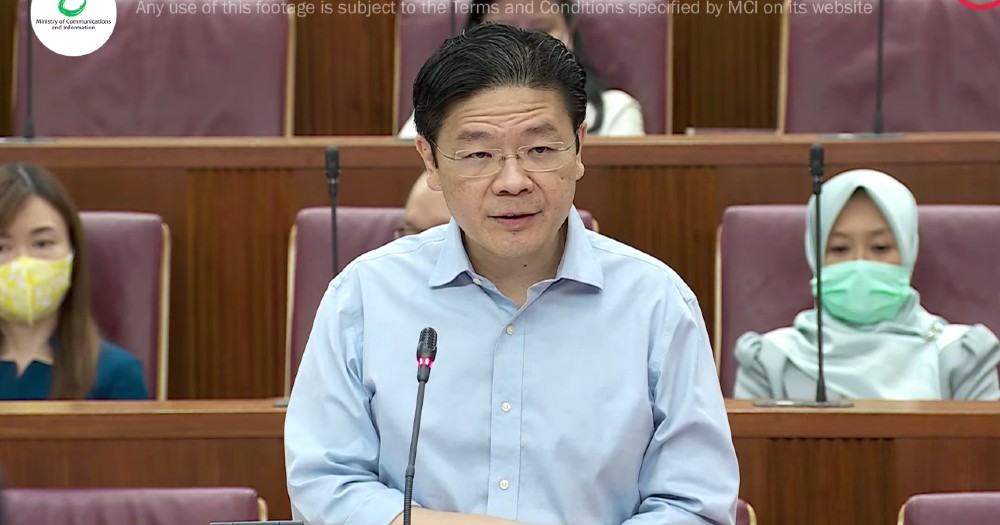Follow us on Telegram for the latest updates: https://t.me/mothershipsg
Though the Singapore government collected more tax revenue in Financial Year 2021 (FY2021), this was "largely once-off" and cannot reliably be counted on to fund longer term recurrent and structural spending increases, Deputy Prime Minister and Minister for Finance Lawrence Wong said in Parliament today (Jul. 4).
Wong was replying to the supplementary questions from Leader of the Opposition Pritam Singh on what the government's assessment was on Singapore's current fiscal position, and whether it had "fiscal room" to provide more cost of living support to lower- and middle-income Singaporeans.
Wong also stressed again the need to proceed with the goods and service tax (GST) hike announced earlier in February, as the government will "need the funds urgently to take better care of our growing number of seniors and to meet our rising health care expenditures".
Singapore government collected S$74.76 billion in revenue in FY2021
Citing a report from the Business Times (BT) in May 2022, Singh said the Singapore government collected S$74.76 billion in tax revenue in FY2021, which was 10.5 per cent higher than what was collected in FY2019.
The BT article also stated that this figure was also 21.7 per cent higher than the tax revenue collected in FY2020.
Singh also highlighted that the stamp duty collections was 61 per cent higher in FY2021, as compared to FY2019, before the pandemic started.
"In light of this information, can I understand what is the Minister's assessment of the government's current fiscal position? And how much fiscal room it has to introduce more cost of living support measures for the lower- and middle-income end of Singapore, particularly families and small businesses?", Singh asked.
Wong: Fiscal upside due to "once-off" sentiment-based transactions
In his reply, Wong acknowledged that the government did indeed enjoy some fiscal upsides in its revenue projections.
However, he said that these were "largely once-off upsides" that were due to "higher-than-expected collections" from property and vehicle transactions.
"These are sentiment-based transactions, we can in no way count on them to happen year after year. And certainly, we cannot rely on them to fund our longer term recurrent and structural spending increases. But we did enjoy this upside this year," Wong added.
On government spending, Wong said it was "fortunate" that the Omicron Covid-19 wave was milder than expected, and therefore the government had "some savings" on expenditure.
Wong said it was precisely due to the higher revenue and expenditure savings that the government was able to mount the recent S$1.5 billion support package "within out current budget, within our current means".
"So we are fortunate in that regard but let's not count on these once-off instances to fund our longer term structural spending increases," he said.
Difficult to shield businesses and workers from external cost increases
Singh also asked if the government was willing to consider "targeted and temporary" road tax rebates in light of higher petrol prices.
Wong said that the S$1.5 billion package was designed specifically to help lower income households, families, workers and the more vulnerable groups.
He added that the government was "very mindful" about those who rely heavily on their vehicles to make a living, and therefore provided help through the NTUC U FSE Relief Fund.
"It will be very hard for the government to shield businesses, workers directly from these cost increases which are externally induced," said Wong.
What the government will try to do is provide "short-term relief", and encourage businesses to become more productive, Wong added.
GST hike will go ahead as planned
Nevertheless, Wong said that Singapore must have "sufficient resources" to tackle longer-term challenges, and that it needs to do so in a "fiscally responsible and sustainable manner".
Singapore will therefore need to go ahead with the increase in the GST increase as announced in Budget 2022.
The GST will rise from 7 per cent to 8 per cent in 2023, and to further increase to 9 per cent in 2024.
"We should not push back the GST increase any further as we will need the funds urgently to take better care of our growing number of seniors and to meet our rising health care expenditures," added Wong.
The government is expected to increase spending to 20 per cent of gross domestic product (GDP) by 2030, an increase from the 18 per cent of GDP the government is spending now, said Wong.
He added that it will be "highly irresponsible" if Singapore were to delay the GST increase.
"We will be at risk of a persistent structural funding gap which will continue to widen year by year, and I don't think anyone wants this to happen in Singapore," said Wong.
He then sought understanding from Members of Parliament on the need to ensure a "sound and sustainable" fiscal position in the medium term.
"In the near term there are costs increases, higher prices, lots of concerns and anxieties and we will do our best to deal with that. But we cannot neglect the medium and longer term challenges either," he added.
Top photo via MCI/YouTube
If you like what you read, follow us on Facebook, Instagram, Twitter and Telegram to get the latest updates.
